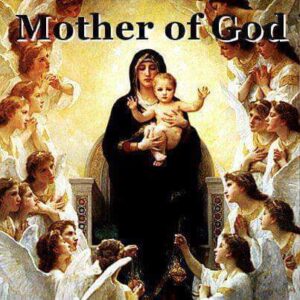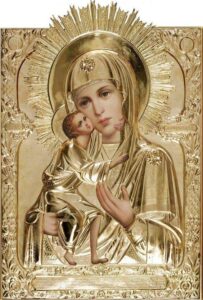BVM Series: Theotokos – The Mother of God
Mariam Deelathhok… (Mary who bore Thee forth, John who baptized Thee……..).
This anthem at the outset of Holy Qurbana asserts and affirms Mary, as ‘Mother of God’. Elizabeth filled with Holy Spirit (Lk 1: 41) pronounced Mary as ‘Mother of my Lord’ (Lk 1: 43). The word “Theotokos” literally means the ‘God-Bearer’ she who bore God in her womb’, (‘Theos’ –God and ‘Tokos’ from the verb ‘tiktein’ – to bear). She is traditionally known as ‘Mother of God’ or commonly translated the ‘Birth-giver of God’, Yoldath Aaloho (Syriac) ‘Daiva Prasavathiri’ (Malayalam).
Mary conceived in her mind before she conceived in her body
St. Augustine
Isaiah prophesied about St. Mary, saying “Behold, the virgin shall conceive and bear a Son, and shall call His name Emmanuel.” (Is 7: 14 and Mt 1: 23). The archangel Gabriel announced to St. Mary saying, “The Holy Spirit will come upon you, and the power of the Highest will overshadow you; therefore, also, that Holy One who is to be born will be called the Son of God”(Lk 1: 35). Our Church confirms its faith that God the Word became Man truly; God was joined to Man in the womb of the Virgin Mary, and that He being perfect Man, is also perfect God. … God send His Son, born of woman… (Gal. 4: 4); also read 1 Tim. 3:16, and Lk. 1: 41-44. Mary was intrinsically, united with the Incarnated Word, in her womb. His divinity sustained as He took flesh and blood from her.

The designation and depiction of Mary as ‘Theotokos’ is ancient and venerable, beginning from the second century, gaining firm establishment by the fourth and fifth centuries. The title ‘Theotokos’ was made official by the III Ecumenical Council (Ephesus, 431 AD) which decreed that the Virgin should be honored by this name which confirms the Orthodox belief in the Incarnation: that Christ was both true God and true man. As so often happened in those days, this action was a response to heretical teachings that needed to be addressed. This title ‘Theotokos’ was rejected by Nestorius (Bishop of Constantinople). He said that she should be called “Christotokos” (birth-giver of Christ). Nestorius preached two distinct persons in Christ, the Son of Mary and the Son of God who were united only morally. He taught that Christ should not be called God, but “God-bearer” (Theophorus). He also preached that the divinity was separated from the humanity at the moment of the Crucifixion. St. Cyril, Patriarch of Alexandria, who was the hero against this heresy at the Third Ecumenical Council at Ephesus in 431 AD, wrote many treatises against Nestorius confirming the Orthodox faith that the humanity in Christ was united to His divinity in one divine Person. Nestorius was deposed and excommunicated at the Council, his Christological doctrine condemned, and the title ‘Theotokos’ solemnly recognized and affirmed by the Church once and for all. We uphold this faith in our creed, where we recite that Christ was perfect man and perfect god, assuming the nature of manhood from virgin Mary, the Theotokos. …. And was incarnate of holy Virgin Mary, Mother of God, by the Holy Ghost and became man….

St. Augustine says, “Mary conceived in her mind before she conceived in her body.” Indeed St. Mary is blessed for she was chosen as the Mother of the Word of God, but before she bore Him physically, she had born Him spiritually through her faith. St. Augustine again says, “Mary’s motherhood would have been of no profit to her if she had not joyfully born Christ (Word of God) in her heart.” St. Gregory of Nazianzus wrote “The bodily and spiritual virginity of Mary ensures us the divinity of our Lord. If anyone does not agree that Mary is the mother of God, he is at odds with God”. The Holy Scripture witnesses to St. Mary’s motherhood of the Son of God, for it calls her Son, “God” (Jn. 20: 28). At the annunciation, angel Gabriel speaks of the Child, as “the Son of the Highest” (Lk. 1: 32), “the Holy One” and the “Son of God” (Lk. 1: 35). The old woman, Elizabeth, wife of priest Zachariah, pregnant with the great prophet and fore runner to the Lord, was the first to confess Mary as ‘Mother of God’. She belittled herself before Mary, as she discovered St. Mary, her Lord’s mother (Luke 1: 43). She said: “How did this happen to me, that my Lord’s mother should visit me?!” Filled with the Holy Spirit, she was led to understand the mystery of the Divine Incarnation. We within the Church confirm that, the One in the womb of Mary is both divine and human.
Daivathe pettoru maathaavaam
Mariayaamettam vazhevettol………..
0 Comments